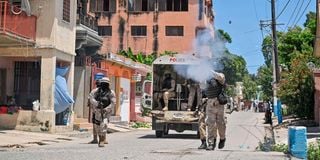Premium
UN Security Council authorises Kenya to deploy police to Haiti

A policeman lobs tear gas as people demonstrate over the rise in the cost of living in Petit-Goâve, Haiti on September 14, 2023.
What you need to know:
- The resolution, 2699/23 was endorsed by 13 of the 15-member Council, including Africa’s representatives.
- Russia and China’s abstention meant their stand didn’t affect the decision on the resolution.
The UN Security Council on Monday night endorsed the deployment of the Multinational Security Support (MSS) Mission to Haiti, paving the way for countries such as Kenya to send their pledged armed personnel to the Caribbean country.
The resolution, 2699/23 was endorsed by 13 of the 15-member Council, including Africa’s representatives; Mozambique, Ghana and Gabon and now authorises the deployment of a Mission that had raised controversy on its legality in Kenya.
The Council passed the resolution under Chapter 7 of the UN Charter, which signals that the situation in Haiti was a threat to global peace and security.
Drafted by the US and endorsed by Ecuador, it needs the validation of all permanent members of the Council, including the US, France, UK, Russia and China. Russia and China’s abstention meant their stand didn’t affect the decision on the resolution, however, allowing pushers, the US, to enable its suggestion to pass.
And African countries in the Council; Mozambique, Gabon and Ghana, said the resolution would be an “important stepping stone” to address the security situation in Haiti, now under the grip of violent gangs.
“We highly praise Kenya for offering to lead the Multinational Security Support Mission. This allows us to move from rhetoric to action for a country whose history should lead us to question the conscience of every one of us,” the African members known as the A3, said in a joint statement. But they said the ultimate solution rests with Haitians to recover their country from the grips of chaos.
“We appeal for a national consensus aimed at an inclusive political transition,” they added.
The mission had been initially a request from Haitian Prime Minister Ariel Henry who wanted his government supported to deal with gangs that had taken control of crucial installations like a local fuel depot. But Haiti’s history including five previous failed foreign interventions had raised controversy.
Russia said the deployment under Chapter 7 had raised the bar and that the resolution needed a rethink before final voting, even though Moscow argued it supports an intervention that could rescue Haiti as long as there is serious thought put into it.
“We hope that the countries involved in the Mission will hold consultations with the Haitian people,” said a representative of China who argued that Haiti’s unstable government, if though it actually asked for the Mission, makes it risky.
In Kenya, legal experts argued it would be unconstitutional even though the government said they were conducting a reconnaissance to understand Haitian terrain. This would be the first time Kenyan police would be deployed to a Caribbean country under this arrangement.
Nairobi has said it will send 1000 police personnel and the US will fund the programme to the tune of $100 million if the Congress agrees. Canada has said it will support the programme too although it will not be sending troops. Jamaica, Antigua and Berbuda, Belize, Senegal, Spain, Suriname and the Bahamas are also expected to send personnel.





